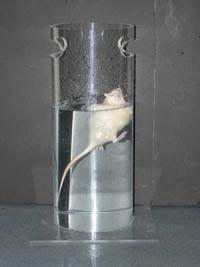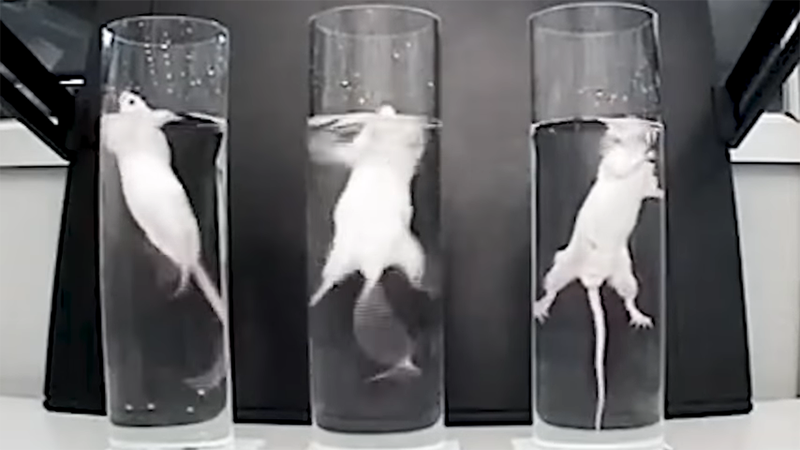University of Michigan faces lawsuit over withholding mouse swim test footage
Editor's note: This is a content warning. The following video and images contain sensitive content that some readers may find offensive or disturbing.
An animal rights group is suing the University of Michigan Board of Regents, saying the university refused to turn over videos of mice forced to swim in plastic cylinders with no chance of escaping as part of a research project to test the effectiveness of a drug on human depression.
The group, Animal Partisan, had requested the documents under the Michigan Freedom of Information Act in December. The university denied the request in January, citing multiple exemptions in the open records law.

Animal Partisan filed the lawsuit on Monday in the Michigan Court of Claims, alleging the exemptions cited by the university do not apply to the videos created in connection with a 2019 study titled "Stress-sensitive antidepressant-like effects of ketamine in the mouse forced-swim test."
The university's Department of Psychiatry conducted the study. A spokeswoman declined to comment, citing pending litigation, but provided a statement from 2022 that said: "The University of Michigan supports the humane, judicious use of animals in research to advance scientific understanding and improve health outcomes for both humans and animals. Through projects that span a variety of fields — including medicine, dentistry, engineering, public health, kinesiology, and natural resources — animals have made critical contributions to human and veterinary medicine and saved countless lives."
According to the National Library of Medicine, a part of the National Institutes of Health, the forced swim test is a rodent behavioral test used, in part, to evaluate anti-depressant drugs and the effectiveness of new compounds in those drugs.
Will Lowrey, a lawyer in Virginia, said his group, Animal Partisan, often files open records requests related to research involving animal tests, and questionable agricultural practices using animals. According to its website, Animal Partisan is a legal advocacy organization that aims to end the suffering of animals in slaughterhouses, farms, and labs by discovering, exposing, and challenging unlawful conduct.
The forced swim test, he said, is not necessary.
"There's no value and no reason to put an animal in a body of water and let them swim," he said. In the case of the forced swim tests involving mice, the results are not useful because they do not translate to humans.
The lawsuit seeks the videos and attorney fees and costs.
"The public has a right to know what happened, to see how the animals were treated, to see how the animals reacted," Lowery said.

In a forced swim test, he said the mice are "terrified, defecating in terror. They go limp. They try and chew and bite the container. … It's a horrific test."
Emily Trunnell, director of science advancement and outreach for People for the Ethical Treatment of Animals, or PETA, said the group has campaigned against the forced swim test for the past six years and has seen fewer studies published in scientific journals based on those test results.
She said researchers use the test because it is easy and low cost: all that's needed is a beaker, a timer, and a few mice or rats.
So how can they tell when a mouse is depressed? The short answer: those who despair and give up are believed to be more depressed than the animals that keep swimming.
Trunnell, who has a doctorate in neuroscience, said the test "produces misleading data and produces results that don't align with humans."
"Just because … a drug affects a rodent swimming doesn't mean it will effectively treat human depression," she said.
The lawsuit said the university denied the videos because the information is exempt under the Confidential Research and Investment Information Act. But in the lawsuit, Ann Arbor lawyer John Reynolds argued that the investment act applies to trade secrets, and commercial or financial information that is provided to a university by a private, outside source.
"These videos do not qualify as trade secrets, commercial information or financial information and further were not provided to the university by a private external source," the lawsuit claims.
The suit also said the university cannot claim that the videos are either trade secrets, proprietary, or commercially valuable material. The study was published in 2019 and the university sought no copyrights or patents from the research. Even if the university were to claim the research had these protections, Reynolds said it has missed the deadline for copyrights and patents.
Related: 'New day in Lansing' as lawmakers advance FOIA bills, introduce transparency measures
As a longtime lawyer for the Detroit Free Press, Herschel Fink, has had many dealings with the University of Michigan over open records requests and called the university "a serial abuser of the Freedom of Information Act."
Fink most recently won a FOIA case against the university over the compensation of a top executive and was awarded thousands of dollars in attorney fees.
Related: Judge orders U-M to tell Free Press how it pays top endowment official
The university, he said, "is all about secrecy."
Contact Jennifer Dixon: jbdixon@freepress.com
This article originally appeared on Detroit Free Press: University of Michigan sued over forced swim tests with mice
